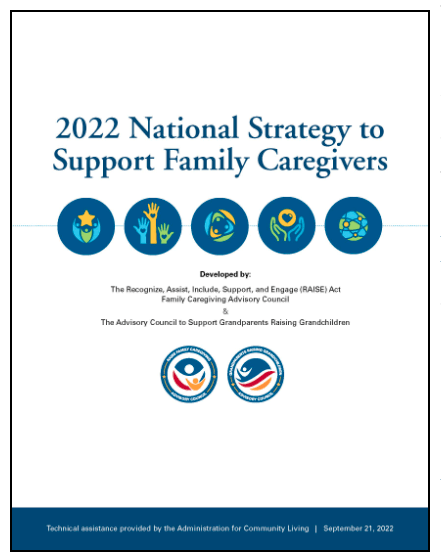National strategy roadmap was informed by LeadingAge LTSS Center research
It’s been a long time coming, but the needs of family caregivers are starting to receive high-level policy attention. At a White House ceremony on September 21, 2022, the U.S. Department of Health and Human Services (HHS), through its Administration for Community Living, presented its 2022 National Strategy to Support Family Caregivers. The report is based on extensive outreach conducted by a team from the LeadingAge LTSS Center @UMass Boston. Public comment on the strategy will inform the ongoing work of two Congressionally mandated caregiving advisory councils.
“Our new, first of its kind national strategy recognizes the critical role family caregivers play in a loved one’s life. I know the importance of this first-hand, as someone who cared for my late father and navigated the challenges associated with caregiving,” said HHS Secretary Xavier Becerra, who cited the research conducted by UMass Boston LTSS Center in his presentation.
Family caregivers provide the overwhelming majority of long-term care in the United States but lack resources to maintain their health, wellbeing, and financial security while providing crucial support for others. “Supporting family caregivers is an urgent public health issue, exacerbated by the long-term effects of the COVID-19 pandemic,” Becerra said.
The national strategy is intended to serve as a roadmap for better recognizing and supporting family and kinship caregivers of all ages, backgrounds, and caregiving situations. It includes nearly 350 actions that the RAISE (Recognize, Assist, Include, Support and Engage) Act Family Caregiving Advisory Council recommends the federal government should take, and more than 150 actions that can be adopted at other levels of government and across the private sector to build a system to support family caregivers.
The strategy is the result of a report published in February 2022 by researchers from the LTSS Center and Community Catalyst’s Center for Consumer Engagement in Health Innovation. The report, Building a National Strategy to Support Family Caregivers: Findings from Key Informant Interviews and Stakeholder Listening Sessions, summarizes concerns, suggestions, and priorities collected from a diverse audience of stakeholders involved in strategy sessions and interviews with representatives of more than 100 organizations. The research was supported by the RAISE Family Caregiver Resource and Dissemination Center at the National Academy for State Health Policy in collaboration with the U.S. Administration for Community Living, with funding from The John A. Hartford Foundation.

With the official release from HHS, “we want all stakeholders to comment on the strategies in order to help refine them and concentrate on the most important ones,” says Pamela Nadash, PhD, associate professor of gerontology and research fellow at the LTSS Center.
The COVID-19 pandemic has given family caregiving far greater visibility and momentum for increasing support, Nadash says. “The issue has been simmering on the back burner for a long time, and COVID brought it more to the forefront. There’s a lot of energy and goodwill out there to move the issue forward. We wouldn’t usually have a White House representative talking about how important the issue is to him. It feels like a bit of a moment.”
Download 2022 National Strategy to Support Family Caregivers
Read more about LTSS Center report on action steps for supporting family caregivers


2 Pingbacks